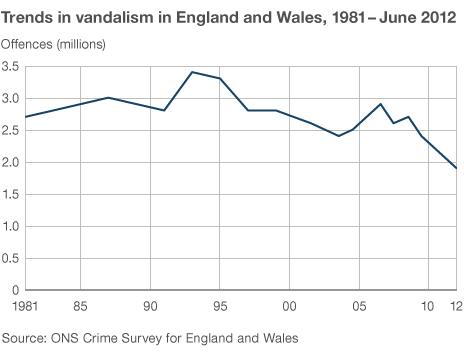The vandals are in their bedrooms
- Published
- comments

Winchester's Butter Cross: A magnet for loitering teens
When I was a teenager, "social networking" mostly involved hanging around with a few mates at the Butter Cross in Winchester's ancient High Street. Or at the coach station. Or, if wet, in the bus shelter.
Without money, it all got very boring very quickly.
Bored teenagers tend to get up to mischief (not me, of course) and a lot of petty vandalism is committed by young people who have got nothing better to do.
But in the past few years, teenage social networking has started moving from the street corner to cyberspace. According to Ofcom, the average 12- to 15-year-old now spends as much time on the internet as watching television - more than 17 hours a week on both. In 2007, young teens spent less than 14 hours online.
Some of that time will be spent doing homework, but a fair amount of it will be taken up on Facebook or other networking sites. Young people are spending huge amounts of their time chatting and flirting and gossiping and arguing with their mates - without ever having to leave their bedroom.
And when they are not on the internet, they are probably on their mobile. Youngsters aged 12-15 now send almost 200 texts or instant messages from their phone in an average week - almost four times as many as five year earlier.
This age group also now spends an average of 6.6 hours a week gaming - almost 30% use an online games console to access the internet from home.
This blossoming of online social contact is transforming the daily lives of today's teenagers.
Figures published in 2007 (see Condoms or family meals?) suggest, at that time, 15-year-old boys in England and Scotland spent far more time than their European counterparts out with their pals - mostly just hanging around.
In France, just one in six spent most evenings out with their mates. In Italy and Germany, it was roughly one in four. But in England, the figure was 45% and in Scotland, it was nearly 60%.
It would be interesting to see whether those figures have changed much. I suspect they may have done, because some of the time now spent on the internet and texting on the mobile will have replaced those dreary hours spent hanging around at the Butter Cross (or equivalent).
So, the steep fall in vandalism correlates with a steep rise in the use of social media. It doesn't mean that Facebook and Blackberry Messenger have caused the drop in crime, but I do wonder whether the two may be linked.
For decades, people have complained about bored teenagers hanging around and causing trouble. If they are too busy online to hang around as much, maybe that explains why they are causing less trouble.

Note: Data refers to different time periods: a) 1981-99 refers to a calendar year, b) 2001/2-2009/10 refers to a financial year, c) Last two data points refer to the year from July to June